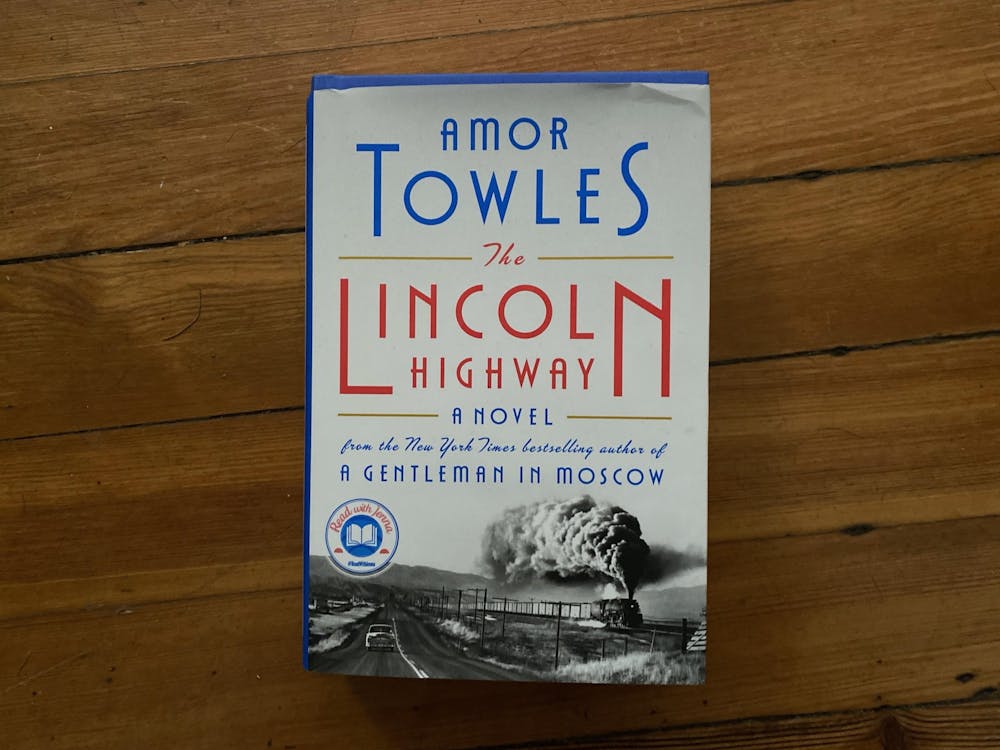I counted down the days to the release of Amor Towles’ “The Lincoln Highway” like a child impatiently counts down the days to Christmas, Edmond Dantés studiously counts down the days to his release from prison and Towles carefully counts down in his table of contents.
Towles, best known for his acclaimed novel — and my favorite book of all time — “A Gentleman in Moscow,” struck gold once again with his much-anticipated October release. Per his usual style, “The Lincoln Highway” leaves readers in constant suspense as chapter numbers count down rather than up. Towles twists whimsy with weightedness in his classic storytelling.
This third novel follows a host of characters — four main ones and a plethora of minor characters who aren’t truly minor at all — on odysseys across the U.S. that toe the line between individual and collective journeys.
The first character we meet, 18-year-old Emmett, has just been released from a juvenile work farm for a crime that was but “the ugly side of chance.” He and his younger brother Billy intend to head west in Emmett's powder-blue, four-door 1948 Studebaker after their father dies and the bank forecloses on their house. They’re joined by two boys from Emmett’s time on the work farm: Duchess and Woolly, who are as entertaining as their names might imply.
Towles is an author with many talents, but one skill supersedes the rest. He develops each of his characters so wholly that the line between real and imagined blurs.
Unlike authors Milan Kundera or Dubravka Ugrešić, for example, who use characters merely as devices to discuss larger themes, Towles builds characters blood vessel by blood vessel, bone by bone, dream by dream for nothing but their own sake. Each figment of his imagination turns tangible, and he devotes time to creating three-dimensional people with their own histories and futures out of only ink and paper.
Chapters switch narration primarily between Emmett, Duchess and Woolly, but there is a smattering of other voices in the mix.
There’s Ulysses, a nod to Odysseus from the classic epic and a man Emmett and Billy encounter while hitching rides on a train. There’s Sally, the lone visible, yet still tangential female character in the story — one of the few critiques I would have to offer Towles — who shares concern and strawberry preserves. There’s Pastor John and Professor Abacus, all of these distinct threads neatly weaved together by Towles.
The tale covers only 10 days — the first chapter is called “10,” and the novel stairsteps downward and forward, accordingly.
Towles is truly unmatched in his ability to create multi-layered, multi-dimensional stories filled with characters who become as endeared to readers as a kid sibling or childhood friend.
His writing is a comfort like homemade soup or a cup of steaming tea. No simile can properly encompass the feeling it leaves you with, and I find myself momentarily closing the book after certain lines, plots and chapters simply to think about how brilliant a storyteller Towles is.
When I think about great literature as a concept, I typically, if erroneously, think backward. Names like O. Henry, Leo Tolstoy, Jane Austen, Charles Dickens and the Brontë sisters populate my mind. Towles, at 56, is only three novels into his writing career, but his work places him directly into this heralded group.
His word choice is beautiful. His ability to maintain control over a handful of characters and zig-zagging plots is mind-boggling, and I would love, or more likely hate, to see the planning process for this nearly 600-page tome.
Towles is the rarest kind of writer, one who can give readers a story that can be enjoyed either uncritically at face value or delved into and scoured for new meaning each read.
To paraphrase the wise 8-year-old Billy about 200 pages into the story, “If you knew where (the lessons) were, then you wouldn’t have to find them.”




